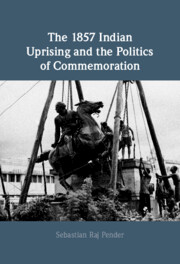Book contents
- The 1857 Indian Uprising and the Politics of Commemoration
- The 1857 Indian Uprising and the Politics of Commemoration
- Copyright page
- Dedication
- Contents
- Figures
- Acknowledgements
- Abbreviations
- Introduction
- 1 ‘Remember Cawnpore!’
- 2 ‘Forget Cawnpore!’
- 3 Negotiating Fear
- 4 The Mutiny of 1907
- 5 The War of Indian Independence
- 6 Remembering the Mutiny at the End of Empire: 1947–1972
- 7 Celebrating the First War of Independence Today
- Conclusion
- Bibliography
- Index
7 - Celebrating the First War of Independence Today
Caste, Gender, and Religion
Published online by Cambridge University Press: 21 April 2022
- The 1857 Indian Uprising and the Politics of Commemoration
- The 1857 Indian Uprising and the Politics of Commemoration
- Copyright page
- Dedication
- Contents
- Figures
- Acknowledgements
- Abbreviations
- Introduction
- 1 ‘Remember Cawnpore!’
- 2 ‘Forget Cawnpore!’
- 3 Negotiating Fear
- 4 The Mutiny of 1907
- 5 The War of Indian Independence
- 6 Remembering the Mutiny at the End of Empire: 1947–1972
- 7 Celebrating the First War of Independence Today
- Conclusion
- Bibliography
- Index
Summary
Asking what it means to remember 1857 in India today, this chapter relies on semi-structured interviews and participant observation at commemoration ceremonies hosted in Uttar Pradesh during the conflict’s 160th anniversary in 2017–2018 to argue that memory is deeply fragmented and fractured along contemporary sociopolitical fault lines. In this regard, contemporary commemoration of 1857 once again tells us more about the present than it does about the past and may be used as a prism through which to understand the rise of identity politics in India which, from the onset of the post-Congress polity, has come to characterise the political landscape of India. Accordingly, whilst a cursory analysis of how 1857 is commemorated seems to reveal a national consensus on what it means to remember the First War of Independence, a detailed analysis reveals the extent to which memory remains as contingent and contested today as it always has been.
- Type
- Chapter
- Information
- The 1857 Indian Uprising and the Politics of Commemoration , pp. 191 - 218Publisher: Cambridge University PressPrint publication year: 2022

